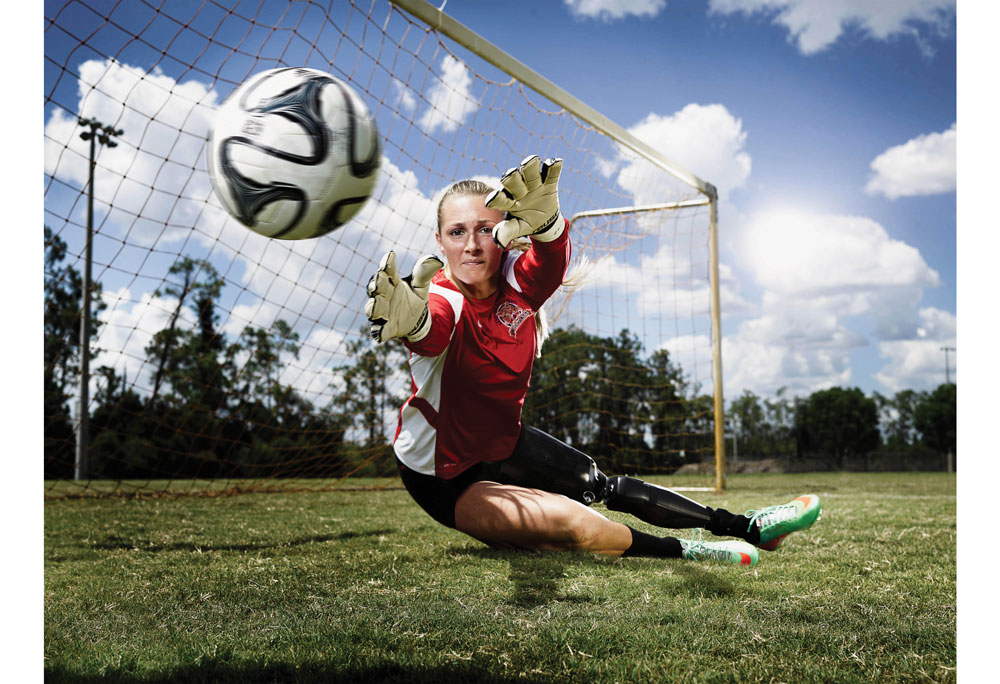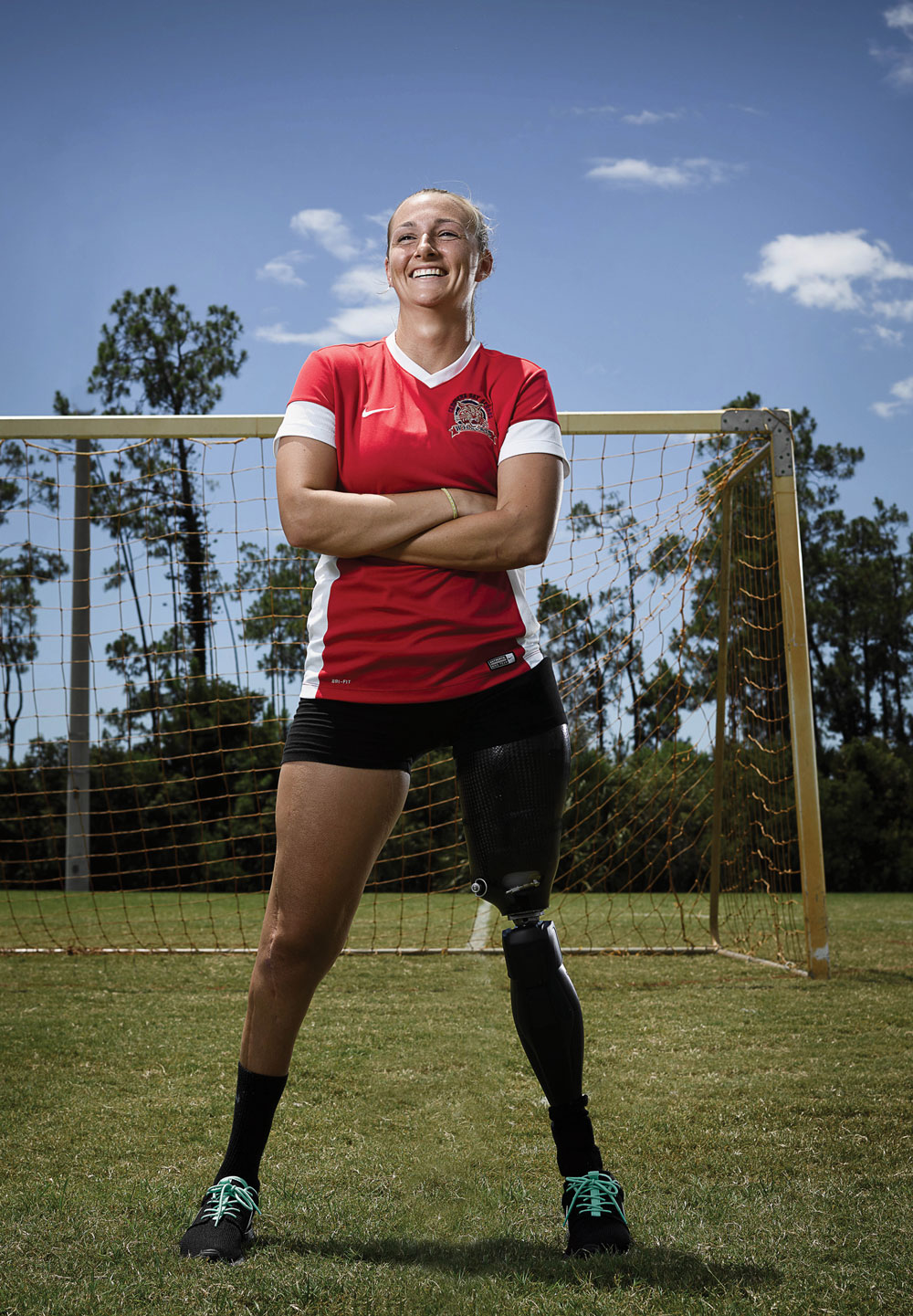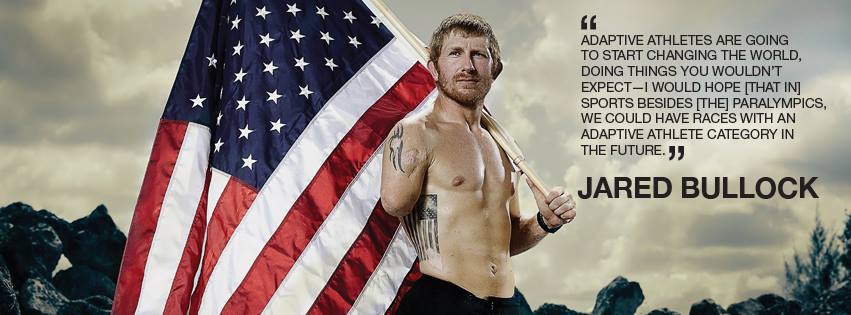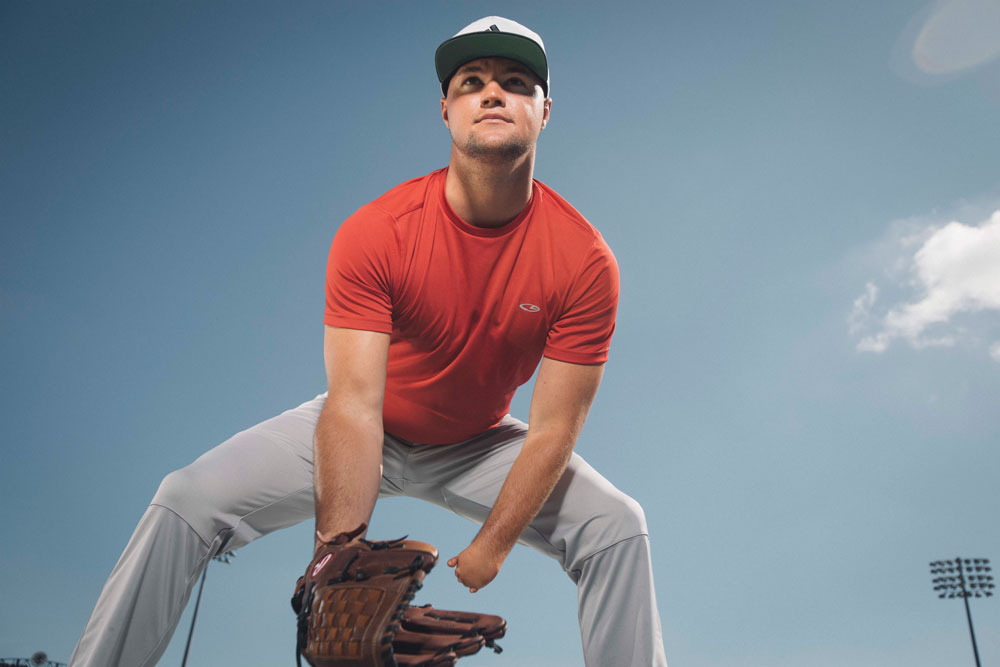Limb difference isn’t the only distinction adaptive sports athletes bear—the greatest might be their remarkable mental resilience and enduring spirit in the face of daunting physical challenges.
As an athlete, you naturally face challenges in your sport of choice. The solution could be something as simple as adding an insole to your running shoe, or stringing your tennis racket in a way that allows for more power and speed on the court. It could be relatively complex, like modifying a nutritional plan for an upcoming race or competition. And of course, at some point or another in your athletic career, you also face the challenges associated with injuries endemic to your sport.
While such challenges can range from small to infinitely intricate, fewer athletes experience having to coming back from—or even start out with—the loss of one or more limbs. The very biological mechanisms needed to perform most athletic feats, a missing limb presents an entirely new set of sobering challenges that aren’t marked on an athlete’s usual roadmap.
Limb-different athletes, also known as adaptive sports athletes, have one thing in common: an incredible story of success against the odds. How they fought back to play sports after traumatic injury or disease, or, in the case of congenital limb difference, how they began playing in the first place. And while international multi-sport events like the Paralympic Games have put the spotlight on adaptive athletes, roadblocks still exist toward letting them play on non-disability teams, whether it’s a skeptical coach, a concerned parent, or simply shortsighted competition rules.
Often what might be missing physically is more than made up for in mental grit, and adaptive sports athletes have that in spades. Sheer determination, an unflagging will to succeed, and perseverance beyond that of most full-limbed athletes mark them as models of courage and the triumph of will over seeming limitation. “I can’t” doesn’t exist in their vocabulary, because there’s always a way to adapt and simply do it differently.
Here, we proudly feature three adaptive sports athletes with roots right here in Florida. They shared their remarkable stories, triumphs, and beliefs about sports—and just how uniquely devoted and utterly adaptable they are to them.
As a Sergeant first class and member of the 7th Special Forces Class, Jared Bullock had dedicated 12 years of his life to military service. Stationed in Afghanistan, he and two others were on a routine patrol on November 13, 2013, when tragedy struck: their vehicle encountered an infrared explosive device (IED), severely injuring Bullock and his team member, and killing the third passenger.
When the Crest View, Florida, native awoke a month later in the San Antonio Military Medical Center, it was to a grim reality: he was now a double amputee, having lost his right leg above the knee and his right arm above the elbow, as well as suffering other extensive injuries. Refusing to let those injuries dictate his quality of life, Sergeant Bullock threw himself into physical rehabilitation with the same kind of dedication he brought to serving his country.
Only 10 astoundingly short months later, he was running his first 11-mile Tough Mudder obstacle course race in West Virginia, supported by friends, family, and military brothers. He never looked back.
Nearly two years later, he’s got nine races under his belt, including Spartans and Savages as well as a few road races. He’s also a public speaker; he’s shared his story with schools, firefighters, and on social media where he has over 6,000 fans on his Jared Bullock–Support Facebook page.
One of his biggest wishes is to raise awareness for limb-different athletes in all different types of sports, including lobbying for adaptive categories for races outside the Paralympic Games. Based on all that he’s accomplished over the past two years, there’s no doubt this Wounded Warrior will reach those goals and then some.
What was the hardest thing to deal with physically after you became adaptive? Did you have to relearn how to play sports?
For me, I didn’t have any problems. Physical fitness and doing obstacle courses were a huge part [of my career] before that, so I found ways to adapt certain movements. When I got prosthetics, the grace period was shorter for me than for most—10 months after my accident, I ran my first 11-mile Tough Mudder in West Virginia. [At first], I tried running with a prosthetic knee, but the extra ounces felt heavy. I now use the [running] blades and that worked best—it’s a whole different style of running—you use 90% more energy as an adaptive athlete, so I really had to build up my endurance.
Really, the hardest thing for me was the depression [I experienced] when I was still in the hospital. This was my career; I’d been doing it for 12 years, so that was a difficult transition.
Do you have a support system of fellow adaptive athletes you correspond with regularly?
You know, beforehand, when you’re not an amputee, it’s not something you know about … but now, it’s an everyday part of my life, so I know a lot of other [adaptive] guys who do races, too. I don’t know if we’re drawn together, but we’ll exchange tips and tricks and chat on Instagram a lot.
What was the proudest moment you’ve experienced since your accident?
Actually, it wasn’t a race—it was the first time I got to put on my prosthetic leg and go walk into my kid’s school to pick him up.
What advice do you have for other adaptive athletes?
[Tweet “You don’t know what you’re capable of until you try. Life has no limits until you place them there.”] Set [your] sights on where you want to be and don’t let anything get to you.
Adaptive athletes are going to start changing the world, doing things you wouldn’t expect—I would hope [that in] sports besides [the] Paralympics, we could have races with an adaptive athlete category in the future.
So what does the future hold for you? Do you want to expand into other sports?
I want to try doing triathlon sports eventually. I hope to evolve and adapt [my skill set] based on my strengths and weaknesses.

By the end of her senior year at Freedom High in Tampa, Bree McMahon had big plans. A star player on her State Cup soccer team, she had fielded multiple offers to play collegiate soccer, and was looking forward to starting at the school of her choice, Brevard College, on scholarship in the Fall.
That all changed in an instant during a routine carwash fundraiser for her soccer team that nearly turned fatal. A driver lost control of their car and pinned her to a brick wall, crushing both her legs and setting her down a new path of rehab and an all-new way of life. She lost her left leg above the knee as well as most of the muscle in her right calf—a sobering prospect to face as an avid soccer player who, before, relied heavily on her running skills to make game-winning plays.
Against the odds (and a scary first diagnosis in which she nearly became a double amputee), she persevered and became a collegiate soccer player by doing what most limb-different athletes do so well—adapting. After sitting on the bench all freshman year for rehab, she changed positions from field player to goalkeeper and started scoring time on the field.
Now a recent Brevard College graduate, McMahon plans to turn her love of soccer into a professional coaching career. Already a high school coach in the Asheville, North Carolina, area, she has also served as coach for Sam Kuhnert’s non-profit organization, NubAbility Athletics Foundation, as well as the Olympic Development Program for North Carolina. Those big plans she had at the end of high school? They’re now even bigger, and more limitless than ever before.
Tell us a little about the aftermath of your accident.
I lost my left leg above the knee and had major damage to my right leg—I lost 95% of my calf muscle, so my ankle is basically fused. I was in a medically induced coma for six days, and the doctor had [originally] wanted to amputate both legs, but my family fought for me. I would’ve never have been the same person [if I’d lost both].
[After the accident], all my friends and family were very supportive, and then I was determined to prove to the doctors I could [play again]. I’m always up for a good challenge, and with everyone looking at me like, “good luck with that,” I said, “thanks, I will!” I always knew I could play soccer again; I was 99% sure I was going to do it. [At Brevard], I had to sit out freshman year for rehab but started playing my sophomore year. I became a goalkeeper because I couldn’t run like I could before as a field player.
What was your biggest accomplishment during your college career as an adaptive soccer player?
This year, [at Brevard] I played 20 minutes against the Gardner-Webb [University] reserve team, and I had some saves and no one scored on me, but they had six goals scored on them. To shut them out [like that] was a really awesome accomplishment.
[Another big one] was receiving the Perseverance Award for my soccer team at our annual awards banquet.
What has been your level of involvement with NubAbility?
NubAbility contacted me on Facebook. I checked them out, and [since then], I’ve done camps for them [as a coach]; there was a camp in Fort Myers, and two other times, [I’ve] gone to Illinois. I’ve helped out as a soccer, volleyball, coupling/gymnastics, and baseball coach.
What advice would you give to other adaptive athletes?
The only limits are the ones you set up for yourself. If you can’t do something one way, there’s another way to do it. You have to adapt to every situation or workout. Find something that works for you. I also do CrossFit, and I do something to make up for [exercises I can’t do]: [for example], I’ll do row instead of runs. There’s always a way to adapt.
What has changed the most for you since becoming an adaptive athlete?
How much I took soccer for granted. In the last game I ever played in [before my accident], I mouthed off to a ref and got yellow carded—they called a hand ball on me and I argued with him [about it] being out of bounds. [Also], I don’t take friends and family or anything for granted.
Also just the physical endurance—walking around is like running now. It takes my body three times as long to recover as my teammates’. I’m using my calf and everything I have, so the first week of pre-season [soccer], my calf is usually sore for about three weeks.
What’s next for you now that you’ve graduated college?
I’m head coach for women’s [soccer] this season at Carolina Day School, a high school in the Asheville area. I’ve also coached the past two years for the Olympic Development Program for North Carolina. I love coaching—seeing your girls leave practice with a smile on their faces. [With] a lot of the girls, their excuses don’t work with me, so I don’t let them get away with as much; I don’t let them skip stuff. I say, “if I can do this, you can do it too.”
Related: Tougher Than Cancer
Sam Kuhnert is one busy man. Between acting as head coach and COO of NubAbility Athletics Foundation, the non-profit organization he founded with his mother, Jana Kuhnert, back in 2012, running this month’s NubAbility All-Sport Summer Camp, and networking to attract potential coaches and campers via NubAbility’s YouTube, Instagram, Twitter, and Facebook pages, he’s got more on his plate than the average 22-year-old.
As described by Kuhnert and team on their official website, NubAbility Athletics Foundation is “a one-of-a-kind non-profit organization dedicated to helping kids with limb loss get off the bench and into the game. Our team of high school, collegiate and professional athletes teach the youth to not only play, but to play the best with less – and win.”
This winning attitude that Kuhnert and his team of coaches try to impart to limb-different kids at their summer camps and Focus Sport Clinics has been part of his lexicon since childhood. Growing up, he was often bullied at school and doubted by coaches for his own congenital limb deficiency, so his parents fortified his confidence by using Bible scriptures to show him that he was perfect just as he was.
These days, Kuhnert is dedicated to helping limb-different kids (ages 4–18) just like him to build a strong sense of self-worth early on, especially when it comes to athletics. Encouraging them to push past their comfort zone and play sports where they’re actively using their limb difference maximizes their abilities as athletes.
People have started to take notice; one of NubAbility’s athletes was recently featured as a Fox Sports Athlete of the Week; a December baseball and softball camp was co-sponsored by the Minnesota Twins and held at their spring training field in Fort Myers; and they are attracting world-class mentors like former WWE Superstar Zach Gowen and U.S. Amputee World Cup soccer goalie Eric Westover, just to name a few. Not to mention the growth of the camp itself—it has ballooned from just seven coaches and 19 attendees in July 2012 to 50 coaches and over 125 campers expected this summer
That’s quite an accomplishment for an organization whose headquarters and core training facility is located in Du Quoin, a town of just over 6,000 in southern Illinois.
Talk a little bit about growing up limb different.
I was born without a left hand; I have a full left arm but a nub at the wrist. Growing up, I had people doubting me and telling me I could never do this or that. I also had some bullying early on in life. My parents were always very supportive and used scriptures in the Bible to help me understand I was created perfectly. [Tweet “I turned those doubts around as fuel to prove people wrong, “]whether that was going to Little League or playing high school baseball.
As a pitcher and outfielder, I never had issues because, at a young age, I had already perfected glove transfer and hitting. I worked my butt off in the gym and after real practice ended, my own practice would begin.
How did you found NubAbility and what are its goals?
The summer before my senior year of high school, I received an email from Camp No Limits, a [limb loss] support group camp for young people. I went because they asked me to be their athletic director. [At camp], I asked what sport they wanted to play, they all said “soccer, soccer, soccer,” and my thought was, “you have two feet, but you’re missing hands.” So I [started] talking to parents about having [their kids] trying out another sport. They were scared to let their kids fail, but you build off failures in order to succeed. I also had one-on-one time with the kids and threw footballs, did glove transfers, and shot basketball, and I discovered such raw ability and talent, and I thought, “they are being so underutilized.”
I told my mom that we needed to change this, to change the way the kids look at themselves and how parents look at their kids. Everyone deserves a chance; they just need proper instruction and confidence. So I put NubAbility into action in the spring of my senior year. Our first camp was July of 2012; we had seven coaches and 19 campers from all over the country. I recruited all the coaches through Google and Facebook. This year, we have 50 coaches and 125 or so kids. What’s crazy is [that] all these kids are coming from big cities and [from] across the country to Du Quoin, our little town in southern Illinois, for this camp!
What’s your ultimate goal with NubAbility—where do you see it heading in the future?
I got [the opportunity] to play baseball in the Dominican Republic, and in Latin American, limb-different people are [often] shunned and aren’t allowed to play sports. They either hide [limb difference] by stuffing their jeans or sweatshirts, or give kids up for adoption. But when I got to pitch there, kids were watching the game—it was eye opening. So my ultimate goal would be to bring NubAbility into Latin America and have clinics with limb-different kids who haven’t had the opportunity to play before.
What’s a piece of advice you’d give to limb-different kids who are interested in playing sports?
In life, you’re going to be competing with people who have all their limbs, so I would just want them to see that they’re created perfectly just the way they are and can put their minds to anything they want to. [At some point], you’re going to fail because failure is part of life, but if you build off of failures, you will be successful.
Check out some of FN’s other impressive athletes…
The Athletes At The Senior Games Will Amaze You
Want To Be A Better Athlete? Watch Your Local Special Olympics


